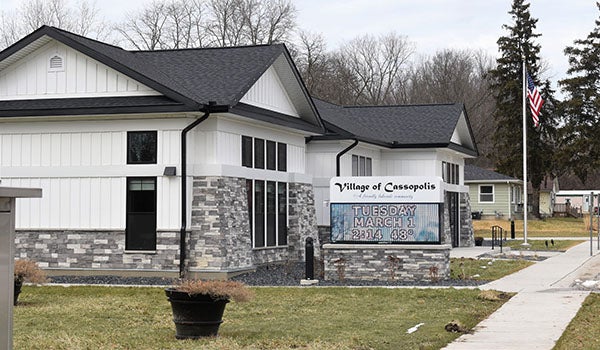Niles City Council approves CDBG Action Plan amendments, discusses zoning
Published 1:52 pm Wednesday, February 14, 2024

- (Submitted)
|
Getting your Trinity Audio player ready...
|
NILES — The Niles City Council tackled several topics during its Monday meeting including the city’s Community Development Block Grant Annual Action Plan, area public transportation and discussing zoning ordinances.
Council members voted 4-1 to approve substantial amendments to the 2022-2026 Consolidated Plan and substantial amendments to the PY 2023 Community Development Block Grant Annual Action Plan. Changes to the consolidated plan include the addition of projects including
public facilities acquisition, rehab and construction projects and interim assistance projects such as neighborhood cleanups, street, sidewalk and utility repairs.
According to the council’s report, the City of Niles received $276,959 in CDBG funds for program year 2022 – Oct. 1, 2022 to Sept. 30, 2023 – and is now able to reallocate $216,514.10 in remaining, prior year funds as well as the remaining ~$48,500 in CDBG-CV funds, which will provide the City the opportunity to run its Code Enforcement Program as well as offer increased access to public services for youth, the homeless and impoverished. The CDBG Program in Niles offers increased opportunities to eliminate blight and facilities support to important projects, repairs and additions to local infrastructure.
Council member Michael Thompson voted no on the action plan. He said he’d rather see the CDBG funds set aside in the plan be used on general fund items that fit CDBG criteria in order to free up general fund dollars to improve sidewalks and roads.
Huff said that there’s a limited amount of CDBG funds that can be used on such projects because funds have to be verified to be impacting moderate and low-income members of the community. He added that the dollars set aside for code enforcement helps offset city department costs and allows those departments to remain adequately staffed.
“It’s a little complicated because the zones where those dollars can be spent and the requirements to verify that those dollars are impacting low and moderate income become pretty complex,” Huff said. “We offset general fund expenses as much as you can within the parameters of the grant allows us. I don’t know that they would offset general fund expenses but they could be used for other purposes in that zone.”
Council unanimously approved the local match of $7,732 to the Niles-Buchanan-Cass Area Transportation Study of the Southwest Michigan Planning Commission. The cost will be split between the the council’s Niles-Buchanan-Cass Area Transportation Study Dues Fund and the DART Dues and Subscriptions Fund.
SMPC oversees the Niles-Buchanan-Cass Area Transportation Study, the Michigan portion of the South Bend, Indiana Urbanized Area as designated by the U.S. Census. Their two committees, the Technical Advisory Committee and the Policy Committee, work cooperatively to make transportation funding related decisions for the area. Both committees consist of local representatives, transit providers, citizen representatives, and elected officials from each of their nine NATS member jurisdictions. Membership in this study requires a local match to be made by each jurisdiction.
Council also approved:
- The purchase of safety management services from JJ Keller & Associates, Inc. of Neenah, Wisconsin for two years at a cost of $3,229
- A $4,600 proposal from Wightman for completing the mandated Biennial Bridge Safety Inspections on the city’s three bridges: Broadway Street over the St. Joseph River, Grant Street over Amtrak and Lake Street over Amtrak
- The purchase of a new 2023 Ford F-350 dump truck from Golf Mill Ford of Niles, Illinois for $80,716.03
Council, planning commission discuss zoning ordinance update
After the regular council meeting, a special combined meeting between the council and the Niles Planning Commission was hosted to allow the planning commission to present its 2023 year-end report and zoning ordinance update. The report contains a record of the planning commission’s activity over the past year, as well as an annual review of the Master Plan and the Economic Development Plan. The City of Niles is currently in the process of updating its Zoning Ordinance and has partnered with Williams & Works to do so.
Zoning is a set of regulations that guide how a property can and cannot be used, with the planning commission being responsible for making recommendations on rezoning requests and amendments to the zoning ordinance.
In addition, the report details the planning commission’s work plan for 2024, which includes:
- Complete Zoning Ordinance amendments
- Increase collaboration between other business and economic support agencies to attract business to the region
- Focus on bringing housing to the City of Niles/increasing housing stock
- Promote expansion of the Indiana-Michigan River valley Trail
After the brief presentation, council members were able to ask questions regarding the planning commission’s report. Council member Thompson asked why the city has a zoning ordinance at all and cited Houston, Texas as an example of a municipality he believes is thriving in large part because it does not have a zoning ordinance.
“It sounds like it’s a stupid question,” Thompson said. “(Houston has) been around quite some time. They’ve been in wars, all kinds of crazy stuff and they have absolutely no zoning whatsoever. So I’m wondering why we even need this thing?”
Councilmember John DiCostanzo, who sits on the planning commission, said he believes that there would be “chaos” without a zoning ordinance in place.
“I certainly don’t want to give up the city’s authority and allow higher governments to take control of it,” DiCostanzo said. “Without some laws that we’re all in agreement on, there would be chaos and there would be a lot of people not wanting to live in the city. So I think people choose where they want to live. People who choose to live out in the township are a lot freer – They have a lot more liberty with their space. They don’t get the enforcement you do in the City of Niles, we have standards that we try to uphold that affect everybody’s property values and affects the income of the city. I think there’s a good purpose for the zoning ordinance.”
“To have effective development of your community and protection, anticipation and opportunity, you do need to do it through a zoning ordinance,” City Attorney Robert Landgraf, Jr. added. “Some communities don’t take zoning very seriously… Our planning commission does an excellent job of recognizing their responsibilities in trying to make this a better Community in which to live.”
DiCostanzo said that the changes being made to the zoning ordinance are giving residents more freedoms than restrictions. If the changes the planning commission has in mind are approved, he said that many city properties once undevelopable due to zoning will be able to be developed.
“We have a lot of properties in the city that currently are undevelopable because they’re too small and don’t allow a home the size that the zoning ordinance requires to be built,” he said. “We’ve looked at things like restrictions of being able to have RVs parked in your driveway and for how long. We’ve tried to loosen up some of those restrictions. We’ve taken a look at a lot of things that restrict individual freedoms and have tried to make them more reasonable than they were originally.”
Council member Tim Rogers, who used to live in Baytown, Texas just outside of Houston, responded to Thompson’s comments about Houston, saying its lack of zoning has had a significant impact on the city financially in having to provide more resources to cover wider areas because of the mixed way the city allowed things to develop.
“No zoning bites you both ways,” he said. “When you allow ‘free will building’ as it were, you’ve got to provide resources to protect those things. Police, fire, EMS, whoever.”
Council member Gretchen Bertschy spoke out in favor of the planning commission and its commitment to amending the zoning ordinance.
“There is a standard by which properties must be maintained,” she said. “There is an understood agreement between we, the neighbors within our municipality, that we chose to reside in. And that agreement is that we will maintain our properties to a smell, sound, sight standard or we don’t live here. I appreciate that the residents of this town are served by an amazing first response team, an amazing staff of employees and volunteers such as the (planning commission) who understand that there really does need to be at best a minimal expectation of what we all gotta put up with so we can go out and find something fun to complain about.”
Thompson emphasized that he did not mean to belittle the planning commission’s work with his words but that he believes the city should think about not having zoning.
“You’re trying to solve problems that were made before you got there and you feel like this is the mechanism by which you can do that and I and I applaud that we all try to solve problems and that’s what you’re doing,” Thompson said. “What I’m suggesting is let’s give limited government a chance. It worked for our founding fathers. As we got more and more government, we got more and more problems. Every time we come up here the solution is ‘let’s have more government.’ Let’s go in the other direction and give that a shot. Everyone around us is trying to do more stuff. Let’s do less and see how that works out for us.
“If it doesn’t work out we can always throw tyranny back into the mix.”
Fouche then asked Thompson if he believed there should not be any boundaries or guidelines in place for residents to follow, with Thompson responding that Fouche misunderstood what freedom and liberty is.
“Freedom is the right to be left alone. Anything that interferes with that is wrong,” he said. Did they already use the right to be left alone by government? Anything else is wrong. Let’s say I like my grass to be 12 inches tall and we come up with an arbitrary figure – three inches, four inches, ten inches – whatever it is, it’s an arbitrary number and yet we’ve decided to throw this on people. Even if it’s three inches, what about people getting offended by four inches? It’s not my job in my house to make your neighborhood look good. It’s not your job to make sure your yard is pristine so that I can feel better about my house. That is my responsibility. That’s what freedom and liberty is about.
“It’s about our self-actions. If I’m doing something that endangers you, if I do some kind of active effort that interferes with your freedom, your liberty, your right to be left alone then I’m the guilty party.”
Mayor Nick Shelton pointed out that the scenario Thompson described was an ordinance issue, not a zoning issue, and that while Houston may not have zoning, it does have ordinances.
I’m talking about zoning,” Thompson said. “Ordinances would be another category that fits that criteria.”






